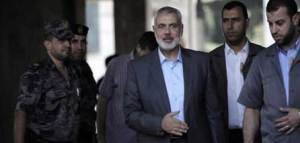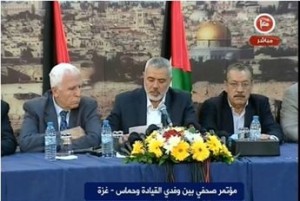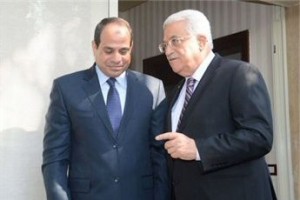Fahwad al-Khadoumi (nsnbc) : Palestine’s Hamas which is ruling the Gaza Strip, declared that it is ready to meet with representatives from the Fatah-dominated Palestinian Authority (PA), the de factor government in the West Bank. The announcement came after the PA threatened to slash funds for the Gaza Strip and after Egypt intervened and held talks with Hamas leaders.
 Hamas published a statement on its website saying that it is ready to engage in talks with the Palestinian Authority led by PA President Mahmoud Abbas. Hamas also stated that it has invited Fatah (al-Fatah – Fateh) to discuss the possibility to dissolve its administrative committee in the Gaza Strip and to hold a general election. Hamas noted that this was part of a reconciliation agreement brokered by Egypt. Hamas said it had agreed to meet with Fatah delegates “in response to the generous efforts of Egypt… aimed to achieve Palestinian reconciliation and end the division.” Hamas also noted that it considers this as a step aimed at achieving national unity, the group, considered terrorist by Israel and some other states, has “invited the reconciliation government to come to the Gaza Strip to exercise its functions and carry out its duties.”
Hamas published a statement on its website saying that it is ready to engage in talks with the Palestinian Authority led by PA President Mahmoud Abbas. Hamas also stated that it has invited Fatah (al-Fatah – Fateh) to discuss the possibility to dissolve its administrative committee in the Gaza Strip and to hold a general election. Hamas noted that this was part of a reconciliation agreement brokered by Egypt. Hamas said it had agreed to meet with Fatah delegates “in response to the generous efforts of Egypt… aimed to achieve Palestinian reconciliation and end the division.” Hamas also noted that it considers this as a step aimed at achieving national unity, the group, considered terrorist by Israel and some other states, has “invited the reconciliation government to come to the Gaza Strip to exercise its functions and carry out its duties.”
Hamas added that it would be willing to meet the PA government without preconditions and fully implement the 2011 Cairo Agreement. On Monday, Hamas announced it wanted to hold meetings with Fatah in Cairo. On Wednesday, Fatah said Hamas would have to first announce the dissolution of its governing body in the Gaza Strip before any talks could commence, Fatah Central Committee member Azzam al-Ahmad told the official PA radio.
The Head of Hamas’s Political Bureau Ismail Haniyya (Haneyya – Haneya) on Saturday headed a delegation of Hamas leaders and left the Gaza Strip to Cairo in order to meet with Egyptian officials. According to a Hamas source, the delegation includes the Hamas leader in Gaza, Yahya al-Sinwar, his deputy Khalil al-Hayya and member of Hamas political bureau Rouhi Mushtah. Other Hamas leaders living abroad are going to join the delegation as well.
Haniyya’s office said that his delegation will discuss, in the first visit since he was elected as Head of the Political Bureau of Hamas, a number of key issues. Most prominent issues include alleviating the Gaza siege, recent developments on the Palestinian Question, ways to regain unity of the Palestinian people and achieving reconciliation as well as the Palestinian-Egyptian relation.
Under different formats, Hamas and Fatah delegations have been in Cairo since to negotiate an agreement proposed by Hamas which has controlled the Gaza Strip for a decade. Palestine’s de-facto civil war started in 2007 after Hamas won elections. When met with armed resistance from Fatah and the PA, Hamas seized power in the Gaza Strip while the West Bank territories fell under Fatah’s control. Since then, all attempts to reconcile the two groups and form a Palestinian power-sharing government have stalled. It I noting that Fatah is the largest member of the Palestine Liberation Organization (PLO). Other PLO members including the PFLP, with reference to the fact that the PA was established as an interim government under the Oslo Accords, have repeatedly stressed that Fatah has abused the PA to usurp key functions and roles of the PLO.
Before the meeting in Cairo, PA President Mahmoud Abbas threatened to implement “further measures” against the Gaza Strip should Hamas not abide by Fatah’s demand that Hamas dissolve its administrative committee, relinquish control of the Gaza Strip to the PA, and hold presidential and legislative elections.
Hamas and Fatah have already signed a reconciliation agreement in Cairo in 2011. The agreement should have led to legislative and presidential elections, but it stalled because of disagreements over who the prime minister would be. In February 2012, the parties signed the Doha agreement where they agreed on a joint political platform and on a truce with Israel. That agreement was never implemented either because Hamas and Fatah could not reach an agreement over a joint election procedure.
In May 2012, Hamas and Fatah signed the Cairo accord reaffirming their commitment to a new unity government and agreed to begin work on holding elections. That, however, did not take hold either. In April 2014, the two factions signed yet another reconciliation agreement, vowing to see a unity government formed within five weeks. They also promised to hold presidential and parliamentary elections within 6 months.
Brokering the alks, the administration of Egyptian President Abdel Fatah al-Sisi stressed its eagerness to permanently open the Rafah border crossing between Egypt and the Gaza Strip provided that the Palestinian side of the border is controlled by “a legal Palestinian government” and not “by the one or the other party, regardless whether it be Hamas, Fatah, or any other party”. Al-Sisi also promised that Egypt would help train border guards and expressed willingness to “deploy Egyptian soldiers to assure the security of a future Palestinian State”.
The government of Israeli President Benjamin Netanyahu, for its par, spoke out against the Palestinian unity government sworn in by President Abbas under the leadership of Rami Hamdallah. Israel suspended peace talks with the Palestinians, refusing to deal with Hamas which it considers a terrorist organization that aims only to destroy the State of Israel. Netanyahu also slapped new sanctions on the Palestinians. It’s worth noting that Israel covertly supported Hamas in the early stages of Hamas’ existence to divide the PLO and to weaken Egypt by backing a Muslim Brotherhood-linked party.
The work of the Palestinian unity government was severely impeded, and forced Hamas and Fatah to meet in Cairo in September 2014, where they agreed on the tasks and responsibilities of any new government. Elections initially planned for the end of 2014 have been put off indefinitely. However, peace talks between Israel and the PA also collapsed in April 2014.
Nickolay Mladenov, the United Nations Special Coordinator for the Middle East Peace Process expressed support for Hamas’ apparent willingness to reconcile with Fatah. Mladenov said that he welcomed developments this week. “Reconciliation is critical to addressing the grave humanitarian crisis in Gaza, preventing the continuing militant buildup and restoring hope for the future,” Mladenov said. He also urged parties to “seize the current positive momentum” in order to “immediately take up its responsibilities in Gaza.” “Gaza is and must be an integral part of any future Palestinian state. Unity is an essential step towards the peaceful realisation of the Palestinian national aspirations,” Mladenov added.
F/AK – nsnbc 17.09.2017
Source Article from https://nsnbc.me/2017/09/17/palestine-hamas-ready-to-talk-with-reconciliation-and-elections-with-fatah-again/
 RSS Feed
RSS Feed















 September 17th, 2017
September 17th, 2017  Awake Goy
Awake Goy 












 Posted in
Posted in  Tags:
Tags: 













